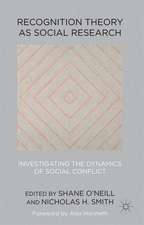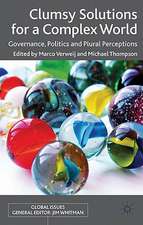Political Decision-Making in Switzerland: The Consensus Model under Pressure: Challenges to Democracy in the 21st Century
Autor P. Sciarini, M. Fischer, D. Traberen Limba Engleză Hardback – 12 iun 2015
Din seria Challenges to Democracy in the 21st Century
- 18%
 Preț: 901.88 lei
Preț: 901.88 lei -
 Preț: 393.35 lei
Preț: 393.35 lei -
 Preț: 392.60 lei
Preț: 392.60 lei -
 Preț: 392.60 lei
Preț: 392.60 lei - 15%
 Preț: 637.59 lei
Preț: 637.59 lei -
 Preț: 388.72 lei
Preț: 388.72 lei -
 Preț: 390.46 lei
Preț: 390.46 lei -
 Preț: 391.79 lei
Preț: 391.79 lei -
 Preț: 385.84 lei
Preț: 385.84 lei - 15%
 Preț: 554.79 lei
Preț: 554.79 lei - 15%
 Preț: 643.29 lei
Preț: 643.29 lei -
 Preț: 419.81 lei
Preț: 419.81 lei - 15%
 Preț: 468.57 lei
Preț: 468.57 lei - 15%
 Preț: 584.43 lei
Preț: 584.43 lei - 15%
 Preț: 591.79 lei
Preț: 591.79 lei - 18%
 Preț: 889.12 lei
Preț: 889.12 lei -
 Preț: 416.71 lei
Preț: 416.71 lei - 18%
 Preț: 893.53 lei
Preț: 893.53 lei - 15%
 Preț: 584.92 lei
Preț: 584.92 lei - 18%
 Preț: 725.92 lei
Preț: 725.92 lei - 15%
 Preț: 691.91 lei
Preț: 691.91 lei - 18%
 Preț: 897.14 lei
Preț: 897.14 lei - 18%
 Preț: 893.71 lei
Preț: 893.71 lei
Preț: 699.77 lei
Preț vechi: 823.26 lei
-15% Nou
Puncte Express: 1050
Preț estimativ în valută:
133.94€ • 145.54$ • 112.59£
133.94€ • 145.54$ • 112.59£
Carte tipărită la comandă
Livrare economică 21 aprilie-05 mai
Preluare comenzi: 021 569.72.76
Specificații
ISBN-13: 9781137508591
ISBN-10: 1137508590
Pagini: 291
Ilustrații: IX, 291 p.
Dimensiuni: 140 x 216 x 18 mm
Greutate: 0.5 kg
Ediția:2015
Editura: Palgrave Macmillan UK
Colecția Palgrave Macmillan
Seria Challenges to Democracy in the 21st Century
Locul publicării:London, United Kingdom
ISBN-10: 1137508590
Pagini: 291
Ilustrații: IX, 291 p.
Dimensiuni: 140 x 216 x 18 mm
Greutate: 0.5 kg
Ediția:2015
Editura: Palgrave Macmillan UK
Colecția Palgrave Macmillan
Seria Challenges to Democracy in the 21st Century
Locul publicării:London, United Kingdom
Cuprins
List Of Tables And Figures Introduction; Pascal Sciarini 1. From Corporatism To Bureaucratic And Partisan Politics: Changes In Decision-Making Processes Over Time; Pascal Sciarini 2. More Power Balance, Less Consensus: Changes In Decision-Making Structures Over Time; Pascal Sciarini 3. Looking Beneath The Surface: Differences In Decision-Making Structures Across Processes; Manuel Fischer 4. Dominance, Competition, Compromise Or Consensus? Explaining Decision-Making Structures; Manuel Fischer 5. Coalition Formation In Parliament And During The Policy Process; Manuel Fischer And Denise Traber 6. Europeanization, Institutional Changes And Differential Empowerment; Manuel Fischer, Pascal Sciarini, And Denise Traber 7. 'Going Public': The Mediatization Of Decision-Making Processes; Manuel Fischer And Pascal Sciarini 8. Who Is Influential And Why? The Determinants Of Reputational Power; Manuel Fischer And Pascal Sciarini 9. Who Is Successful And Who Is Not? Actors' Satisfaction With The Policy Output; Denise Traber 10. Reactive, Slow And Innovative? Decision-Making Structures And Policy Outputs; Manuel Fischer Conclusion; Pascal Sciarini Appendix References
Recenzii
'Is Swiss democracy still the slow-moving consensual model that Arend Lijphart described many years ago? Or have the European Union, globalization, immigration, the Swiss Peoples' Party, changes in bank secrecy regulations, and other factors transformed the political system into something else? In this major new book, three Swiss scholars, basing their analyses on hundreds of interviews and close examination of well chosen empirical cases of policymaking processes, show not only how Swiss democracy has been transformed, but why. It is an important and timely examination of, among other things, the impact of the EU on states that are not even members and the effects of immigrant-focused political parties not just on immigration policy, but on the workings of a nation's political institutions more broadly. It will be of interest to students of comparative politics, parties, direct democracy, and policymaking processes whether or not those readers hold a keen interest in the Swiss case itself.'
Prof. Frank Baumgartner, University of North Carolina at Chapel Hill, USA
'Replication studies are very rare in our discipline of political science. This is why I am particularly pleased with this replication of my own study of the Swiss political system that covered its structure and functioning back in the 1970s. The present study shows how much Swiss politics have changed over the last thirty years and how political power has been rebalanced, at the expense of corporatist policy-making, and in favor of partisan politics, as well as bureaucratic and intergovernmental policy-making. But the present study is far more than just a replication of my earlier work. In addition to the changes in the functioning of this paradigmatic case of a consensus democracy, this truly excellent study also documents the variation of Swiss political decision-making across policy domains, and it assesses its overall character under contemporary circumstances: it suggests that, while drifting towards a form of 'imperfect' consensus, Swiss politics have become at the same time more uncertain and more innovative.'
Prof. Hanspeter Kriesi, European University Institute, Florence, Italy
'This is a splendid book demonstrating the power of sophisticated political analysis. Based on rich empirical data and a variety of methods, the authors provide compelling evidence of important changes in Swiss politics and policy-making. For scholars with an interest into the puzzling politics of Switzerland, this book is a 'must read'.'
Prof. Volker Schneider, University of Konstanz, Germany
Prof. Frank Baumgartner, University of North Carolina at Chapel Hill, USA
'Replication studies are very rare in our discipline of political science. This is why I am particularly pleased with this replication of my own study of the Swiss political system that covered its structure and functioning back in the 1970s. The present study shows how much Swiss politics have changed over the last thirty years and how political power has been rebalanced, at the expense of corporatist policy-making, and in favor of partisan politics, as well as bureaucratic and intergovernmental policy-making. But the present study is far more than just a replication of my earlier work. In addition to the changes in the functioning of this paradigmatic case of a consensus democracy, this truly excellent study also documents the variation of Swiss political decision-making across policy domains, and it assesses its overall character under contemporary circumstances: it suggests that, while drifting towards a form of 'imperfect' consensus, Swiss politics have become at the same time more uncertain and more innovative.'
Prof. Hanspeter Kriesi, European University Institute, Florence, Italy
'This is a splendid book demonstrating the power of sophisticated political analysis. Based on rich empirical data and a variety of methods, the authors provide compelling evidence of important changes in Swiss politics and policy-making. For scholars with an interest into the puzzling politics of Switzerland, this book is a 'must read'.'
Prof. Volker Schneider, University of Konstanz, Germany
Notă biografică
Pascal Sciarini is Professor of Swiss and Comparative Politics at the Department of Political Science and International Relations, University of Geneva, Switzerland.
Manuel Fischer is Researcher at the Department of Environmental Social Sciences at Eawag, Dübendorf, and lecturer at the Institute of Political Science, University of Bern, Switzerland.
Denise Traber is a postdoctoral researcher at the Department of Political Science, University of Zurich, Switzerland.
Manuel Fischer is Researcher at the Department of Environmental Social Sciences at Eawag, Dübendorf, and lecturer at the Institute of Political Science, University of Bern, Switzerland.
Denise Traber is a postdoctoral researcher at the Department of Political Science, University of Zurich, Switzerland.















